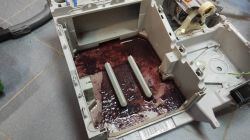mrice wrote:Get down to earth, man.
Heater 560 kWh/year, pump 170 kWh/year and with 160 drying cycles (now ~ PLN 400 cheaper per year), and how about someone like me, where laundry is done every day (-PLN 900)? kWh now PLN 1, and what will happen at PLN 2...
Besides, there won't be a topic for a long time because:
a. Nobody wants to sell heaters.
b. Nobody wants to buy heaters.
c. Heaters are not produced and what is left must disappear from warehouses and/or be returned to the manufacturer for disposal if sales are so low.
mrice wrote:You want to spend PLN 2,000 every 4 years
The cost of comfort, a new piece of furniture, not an old piece of furniture. And who can guarantee that the heating element will not break down after 4 years?





